International Law Case Study: Loewen Group Inc. v. USA - NAFTA Impact
VerifiedAdded on 2023/06/05
|19
|1885
|72
Case Study
AI Summary
This case study examines the Loewen Group Inc. and Raymond L Loewen vs. the USA ICSID Case No. ARB(AF)/98/3, focusing on the legal issues surrounding the North American Free Trade Agreement (NAFTA). The case originated from a dispute between TLGI and a local insurer, O'Keefe, in Mississippi, leading to a significant penalty against TLGI. The appeal to the tribunal centered on alleged breaches of NAFTA, particularly articles 1116 and 1117. Key arguments revolved around TLGI's Canadian identity and whether the tribunal had jurisdiction, given TLGI's subsequent bankruptcy and shift to US control. The tribunal ultimately dismissed the claims, citing a lack of jurisdiction due to TLGI's changed nationality and insufficient proof of Mr. Loewen's control. The decision highlighted the importance of clarity in tribunal scope and increased awareness of international law in trial courts, though it was criticized for not fully addressing all claims. Desklib provides access to similar case studies and solved assignments for students.
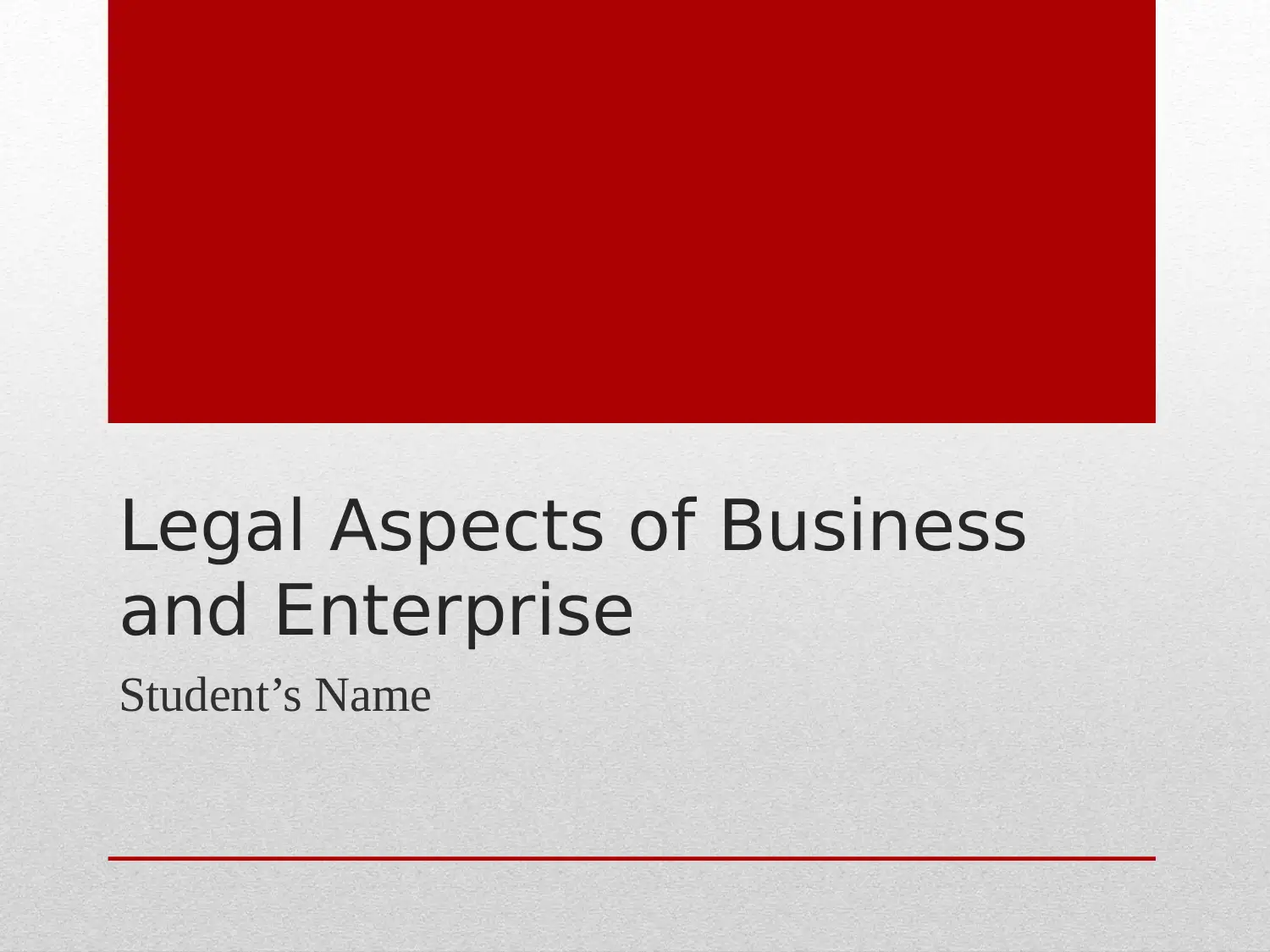
Legal Aspects of Business
and Enterprise
Student’s Name
and Enterprise
Student’s Name
Paraphrase This Document
Need a fresh take? Get an instant paraphrase of this document with our AI Paraphraser
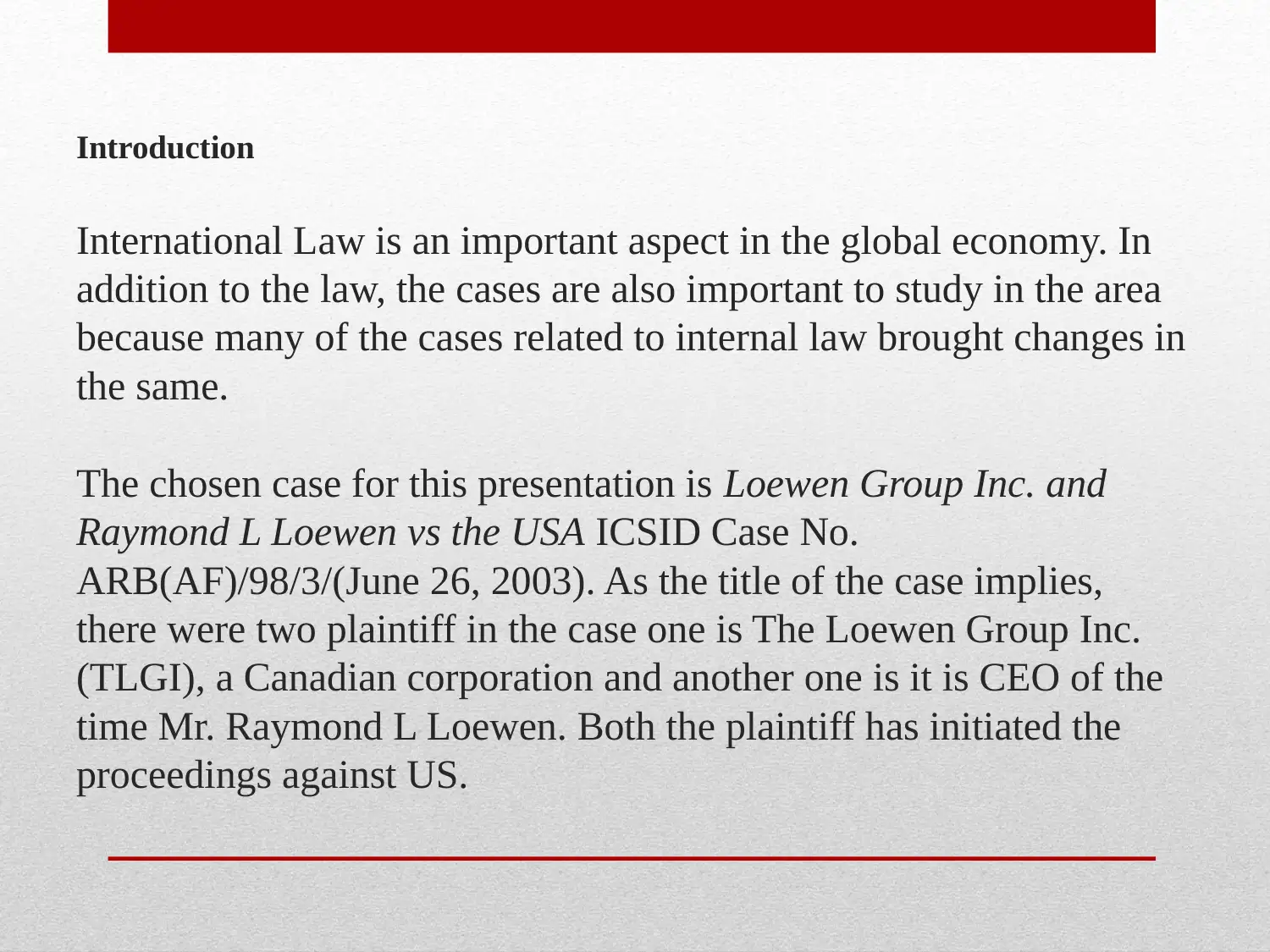
Introduction
International Law is an important aspect in the global economy. In
addition to the law, the cases are also important to study in the area
because many of the cases related to internal law brought changes in
the same.
The chosen case for this presentation is Loewen Group Inc. and
Raymond L Loewen vs the USA ICSID Case No.
ARB(AF)/98/3/(June 26, 2003). As the title of the case implies,
there were two plaintiff in the case one is The Loewen Group Inc.
(TLGI), a Canadian corporation and another one is it is CEO of the
time Mr. Raymond L Loewen. Both the plaintiff has initiated the
proceedings against US.
International Law is an important aspect in the global economy. In
addition to the law, the cases are also important to study in the area
because many of the cases related to internal law brought changes in
the same.
The chosen case for this presentation is Loewen Group Inc. and
Raymond L Loewen vs the USA ICSID Case No.
ARB(AF)/98/3/(June 26, 2003). As the title of the case implies,
there were two plaintiff in the case one is The Loewen Group Inc.
(TLGI), a Canadian corporation and another one is it is CEO of the
time Mr. Raymond L Loewen. Both the plaintiff has initiated the
proceedings against US.
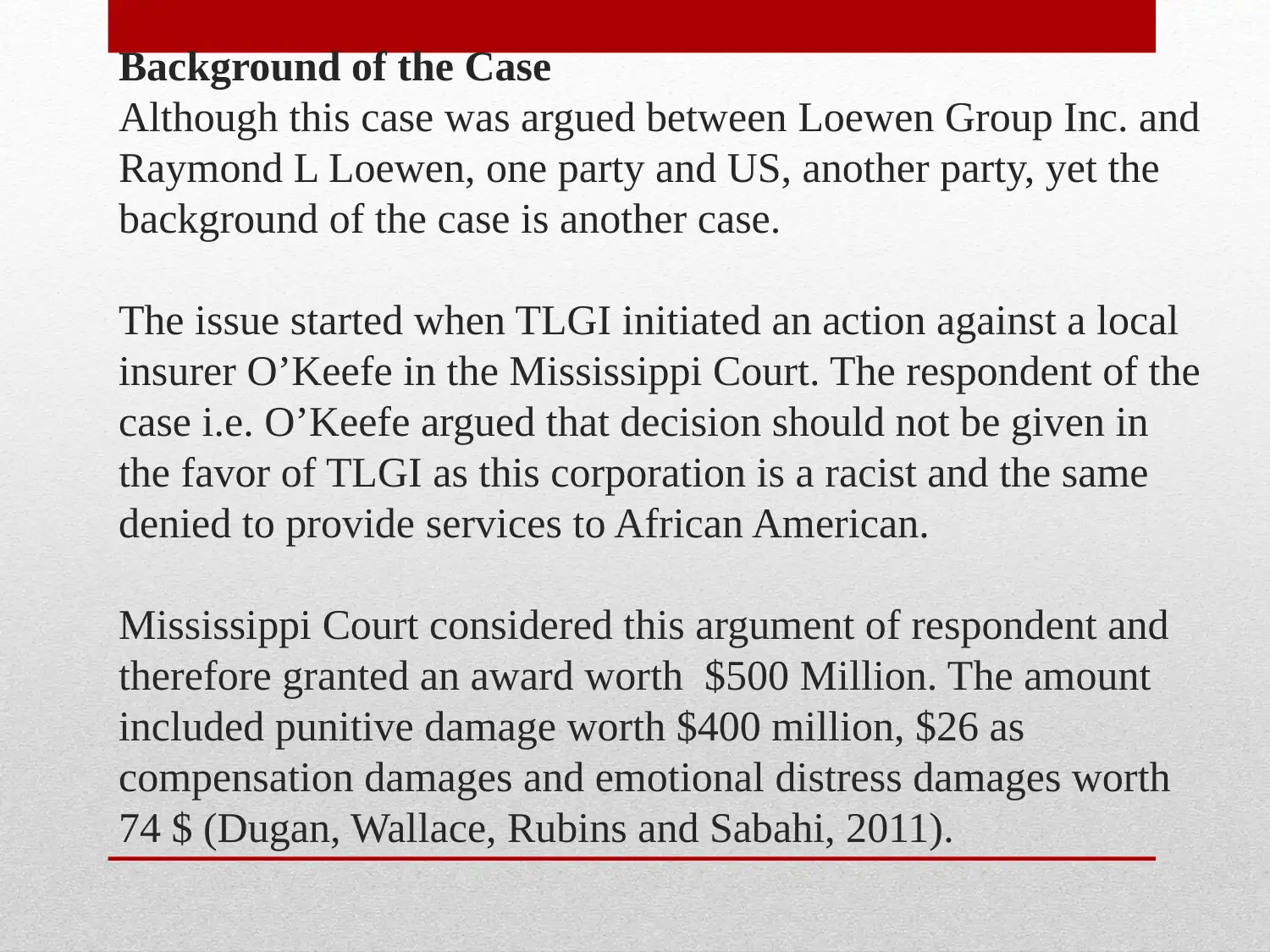
Background of the Case
Although this case was argued between Loewen Group Inc. and
Raymond L Loewen, one party and US, another party, yet the
background of the case is another case.
The issue started when TLGI initiated an action against a local
insurer O’Keefe in the Mississippi Court. The respondent of the
case i.e. O’Keefe argued that decision should not be given in
the favor of TLGI as this corporation is a racist and the same
denied to provide services to African American.
Mississippi Court considered this argument of respondent and
therefore granted an award worth $500 Million. The amount
included punitive damage worth $400 million, $26 as
compensation damages and emotional distress damages worth
74 $ (Dugan, Wallace, Rubins and Sabahi, 2011).
Although this case was argued between Loewen Group Inc. and
Raymond L Loewen, one party and US, another party, yet the
background of the case is another case.
The issue started when TLGI initiated an action against a local
insurer O’Keefe in the Mississippi Court. The respondent of the
case i.e. O’Keefe argued that decision should not be given in
the favor of TLGI as this corporation is a racist and the same
denied to provide services to African American.
Mississippi Court considered this argument of respondent and
therefore granted an award worth $500 Million. The amount
included punitive damage worth $400 million, $26 as
compensation damages and emotional distress damages worth
74 $ (Dugan, Wallace, Rubins and Sabahi, 2011).
⊘ This is a preview!⊘
Do you want full access?
Subscribe today to unlock all pages.

Trusted by 1+ million students worldwide
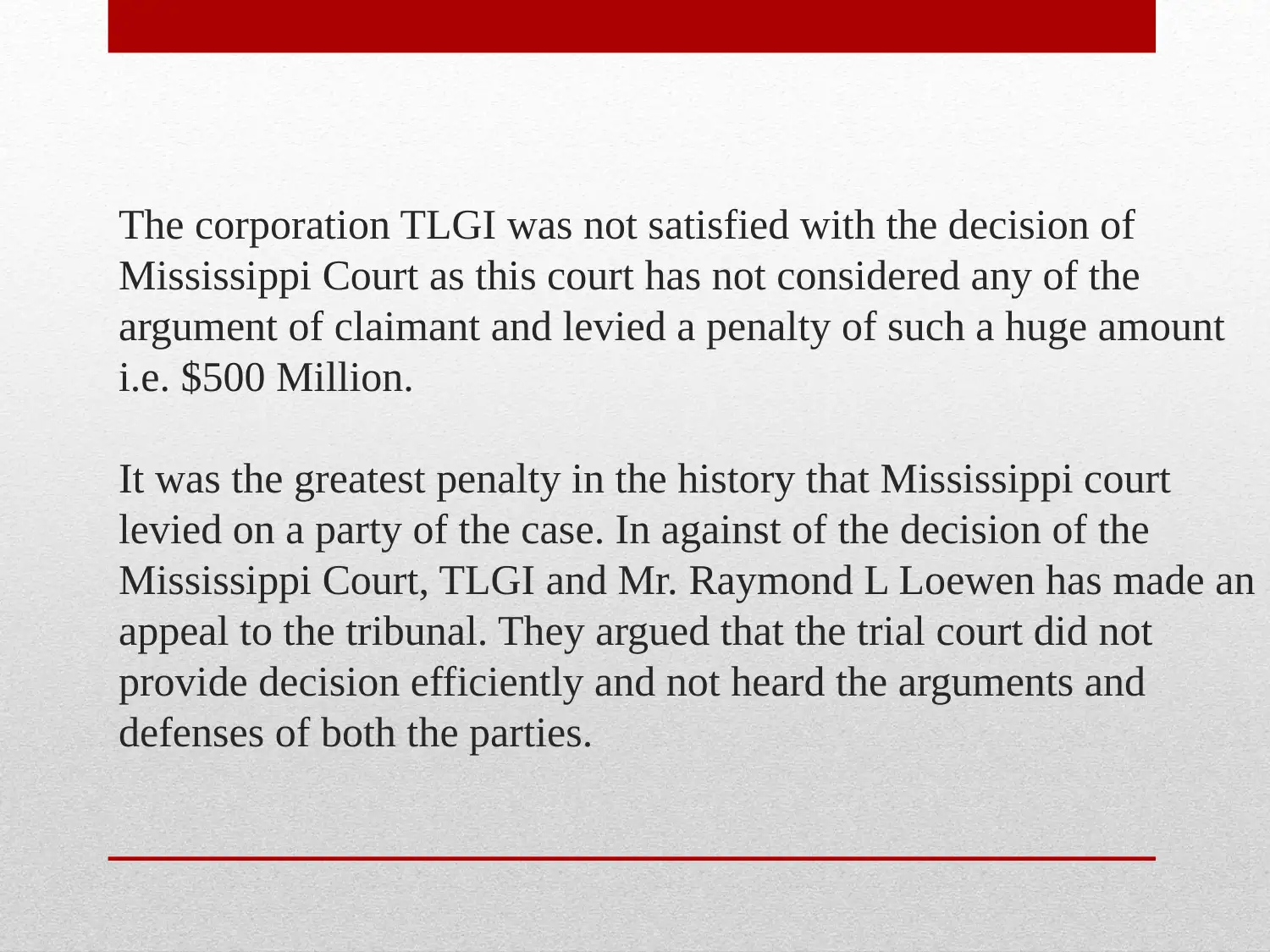
The corporation TLGI was not satisfied with the decision of
Mississippi Court as this court has not considered any of the
argument of claimant and levied a penalty of such a huge amount
i.e. $500 Million.
It was the greatest penalty in the history that Mississippi court
levied on a party of the case. In against of the decision of the
Mississippi Court, TLGI and Mr. Raymond L Loewen has made an
appeal to the tribunal. They argued that the trial court did not
provide decision efficiently and not heard the arguments and
defenses of both the parties.
Mississippi Court as this court has not considered any of the
argument of claimant and levied a penalty of such a huge amount
i.e. $500 Million.
It was the greatest penalty in the history that Mississippi court
levied on a party of the case. In against of the decision of the
Mississippi Court, TLGI and Mr. Raymond L Loewen has made an
appeal to the tribunal. They argued that the trial court did not
provide decision efficiently and not heard the arguments and
defenses of both the parties.
Paraphrase This Document
Need a fresh take? Get an instant paraphrase of this document with our AI Paraphraser
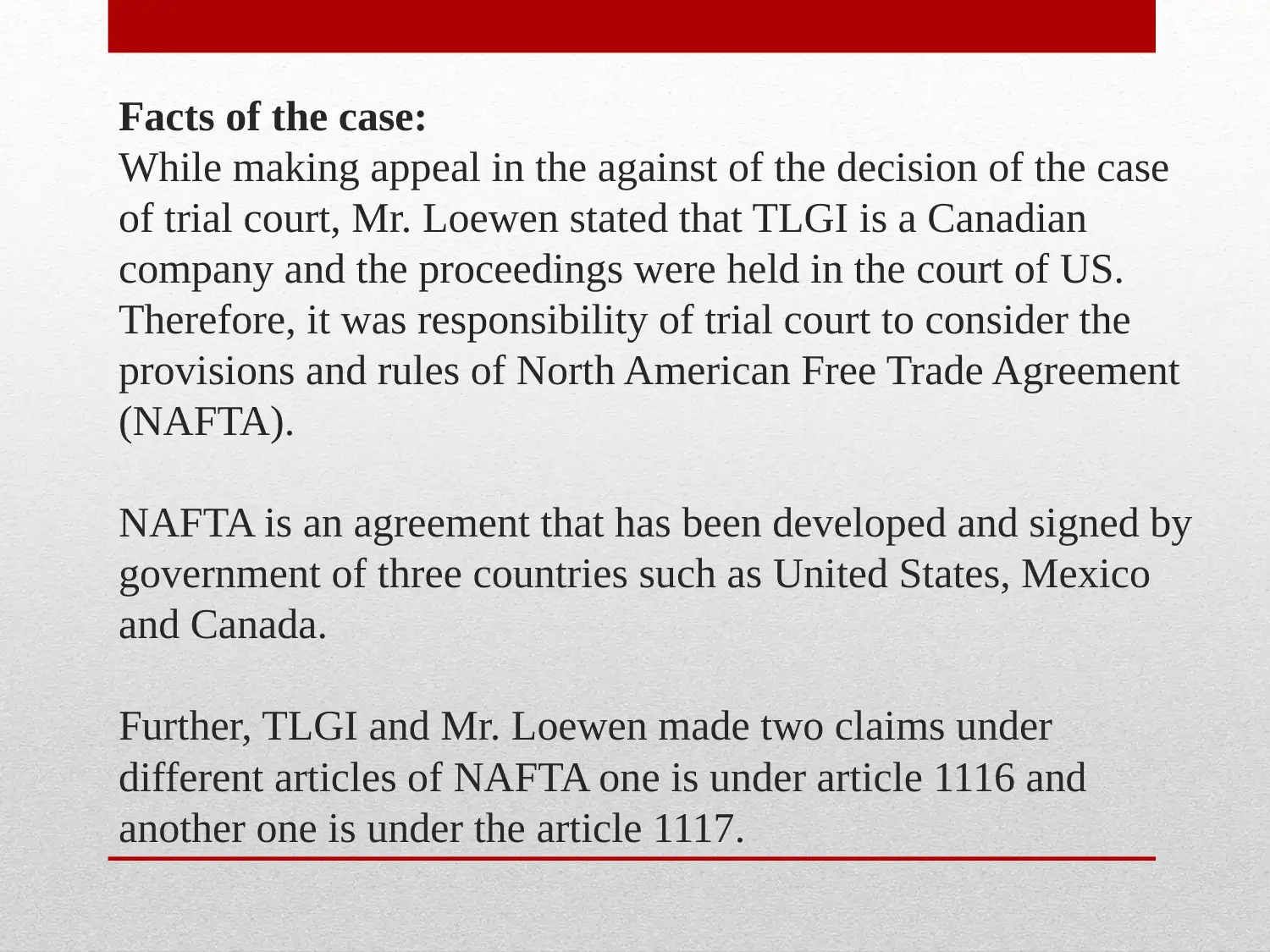
Facts of the case:
While making appeal in the against of the decision of the case
of trial court, Mr. Loewen stated that TLGI is a Canadian
company and the proceedings were held in the court of US.
Therefore, it was responsibility of trial court to consider the
provisions and rules of North American Free Trade Agreement
(NAFTA).
NAFTA is an agreement that has been developed and signed by
government of three countries such as United States, Mexico
and Canada.
Further, TLGI and Mr. Loewen made two claims under
different articles of NAFTA one is under article 1116 and
another one is under the article 1117.
While making appeal in the against of the decision of the case
of trial court, Mr. Loewen stated that TLGI is a Canadian
company and the proceedings were held in the court of US.
Therefore, it was responsibility of trial court to consider the
provisions and rules of North American Free Trade Agreement
(NAFTA).
NAFTA is an agreement that has been developed and signed by
government of three countries such as United States, Mexico
and Canada.
Further, TLGI and Mr. Loewen made two claims under
different articles of NAFTA one is under article 1116 and
another one is under the article 1117.

Both these articles belongs to chapter 11 of NAFTA. Article 1116
states that an investor of the party can initiate an action against
another party if such another party breaches the provisions of
NAFTA and because of such breach, claimant suffers with a loss
(Douglas, 2009).
Further, Article 1117 says that an investor can initiate a
proceedings against the defendant on behalf of an international
entity, if such entity suffers with a loss due to breach of NAFTA
provision by defendant(Douglas, Pauwelyn and Viñuales, 2014).
Mr. Loewen made claim under article 1116 in his individual
capacity and under article 1117 on behalf of TLGI, as it was an
international entity for the purpose of this appeal.
states that an investor of the party can initiate an action against
another party if such another party breaches the provisions of
NAFTA and because of such breach, claimant suffers with a loss
(Douglas, 2009).
Further, Article 1117 says that an investor can initiate a
proceedings against the defendant on behalf of an international
entity, if such entity suffers with a loss due to breach of NAFTA
provision by defendant(Douglas, Pauwelyn and Viñuales, 2014).
Mr. Loewen made claim under article 1116 in his individual
capacity and under article 1117 on behalf of TLGI, as it was an
international entity for the purpose of this appeal.
⊘ This is a preview!⊘
Do you want full access?
Subscribe today to unlock all pages.

Trusted by 1+ million students worldwide
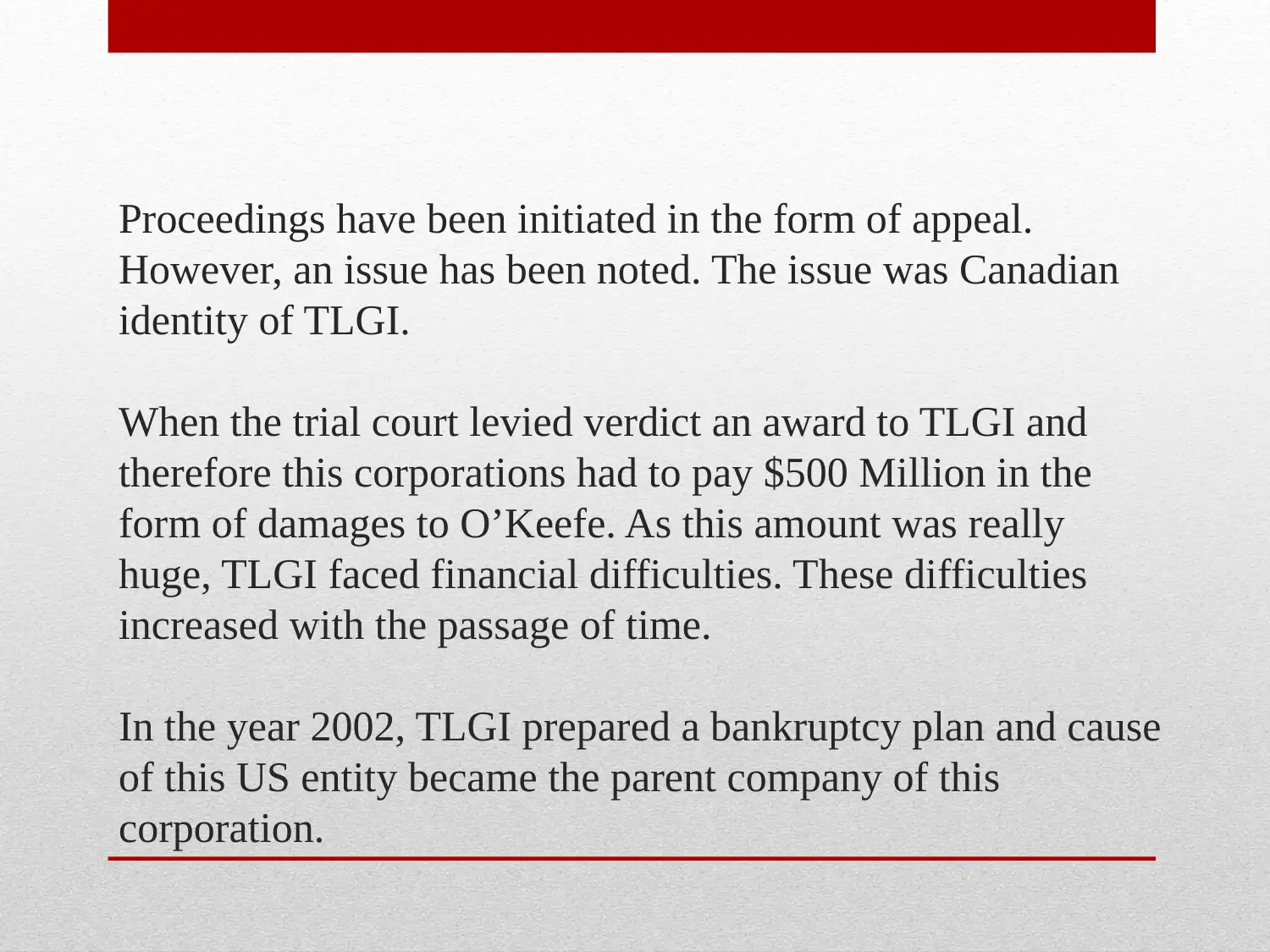
Proceedings have been initiated in the form of appeal.
However, an issue has been noted. The issue was Canadian
identity of TLGI.
When the trial court levied verdict an award to TLGI and
therefore this corporations had to pay $500 Million in the
form of damages to O’Keefe. As this amount was really
huge, TLGI faced financial difficulties. These difficulties
increased with the passage of time.
In the year 2002, TLGI prepared a bankruptcy plan and cause
of this US entity became the parent company of this
corporation.
However, an issue has been noted. The issue was Canadian
identity of TLGI.
When the trial court levied verdict an award to TLGI and
therefore this corporations had to pay $500 Million in the
form of damages to O’Keefe. As this amount was really
huge, TLGI faced financial difficulties. These difficulties
increased with the passage of time.
In the year 2002, TLGI prepared a bankruptcy plan and cause
of this US entity became the parent company of this
corporation.
Paraphrase This Document
Need a fresh take? Get an instant paraphrase of this document with our AI Paraphraser
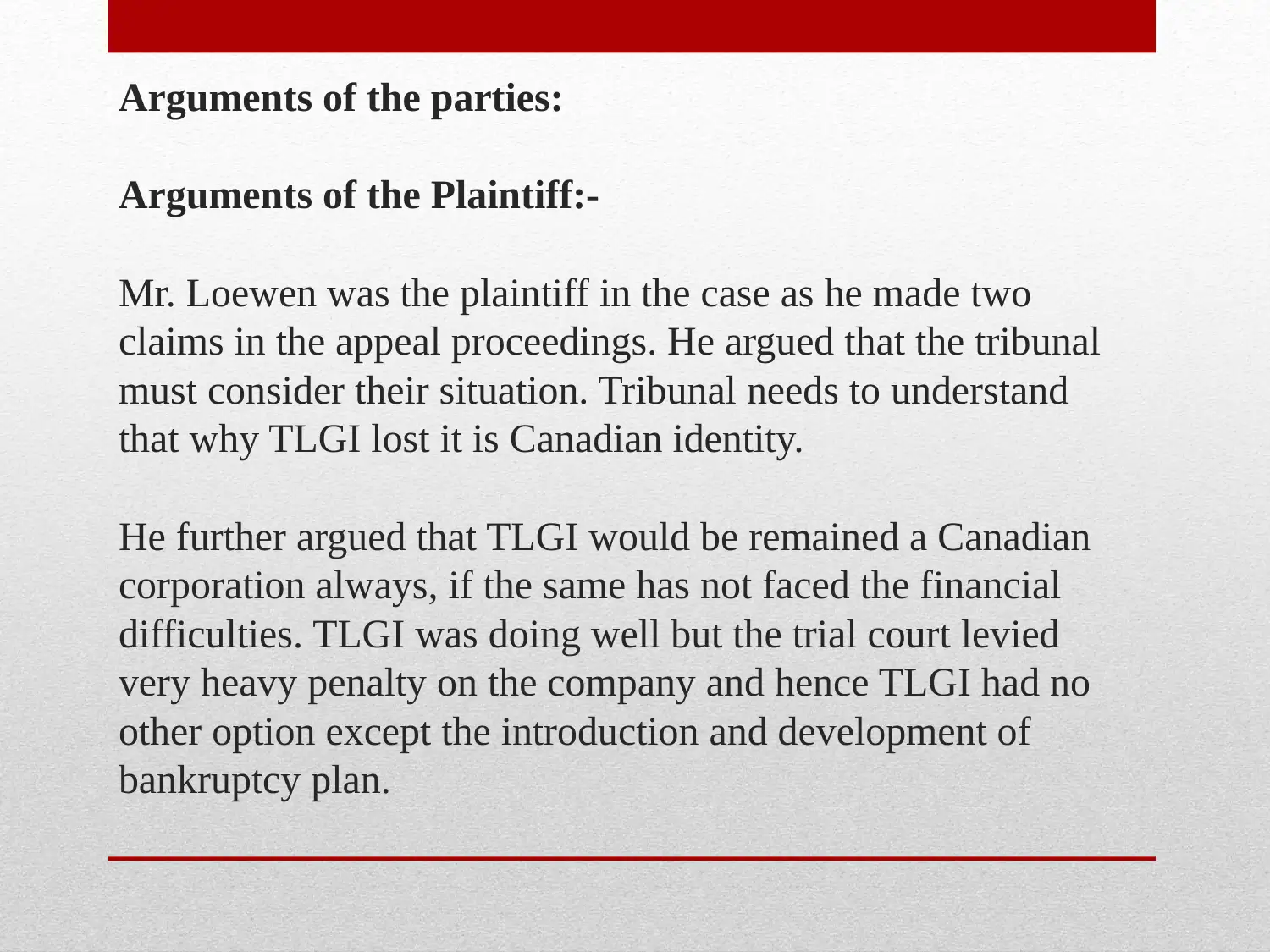
Arguments of the parties:
Arguments of the Plaintiff:-
Mr. Loewen was the plaintiff in the case as he made two
claims in the appeal proceedings. He argued that the tribunal
must consider their situation. Tribunal needs to understand
that why TLGI lost it is Canadian identity.
He further argued that TLGI would be remained a Canadian
corporation always, if the same has not faced the financial
difficulties. TLGI was doing well but the trial court levied
very heavy penalty on the company and hence TLGI had no
other option except the introduction and development of
bankruptcy plan.
Arguments of the Plaintiff:-
Mr. Loewen was the plaintiff in the case as he made two
claims in the appeal proceedings. He argued that the tribunal
must consider their situation. Tribunal needs to understand
that why TLGI lost it is Canadian identity.
He further argued that TLGI would be remained a Canadian
corporation always, if the same has not faced the financial
difficulties. TLGI was doing well but the trial court levied
very heavy penalty on the company and hence TLGI had no
other option except the introduction and development of
bankruptcy plan.
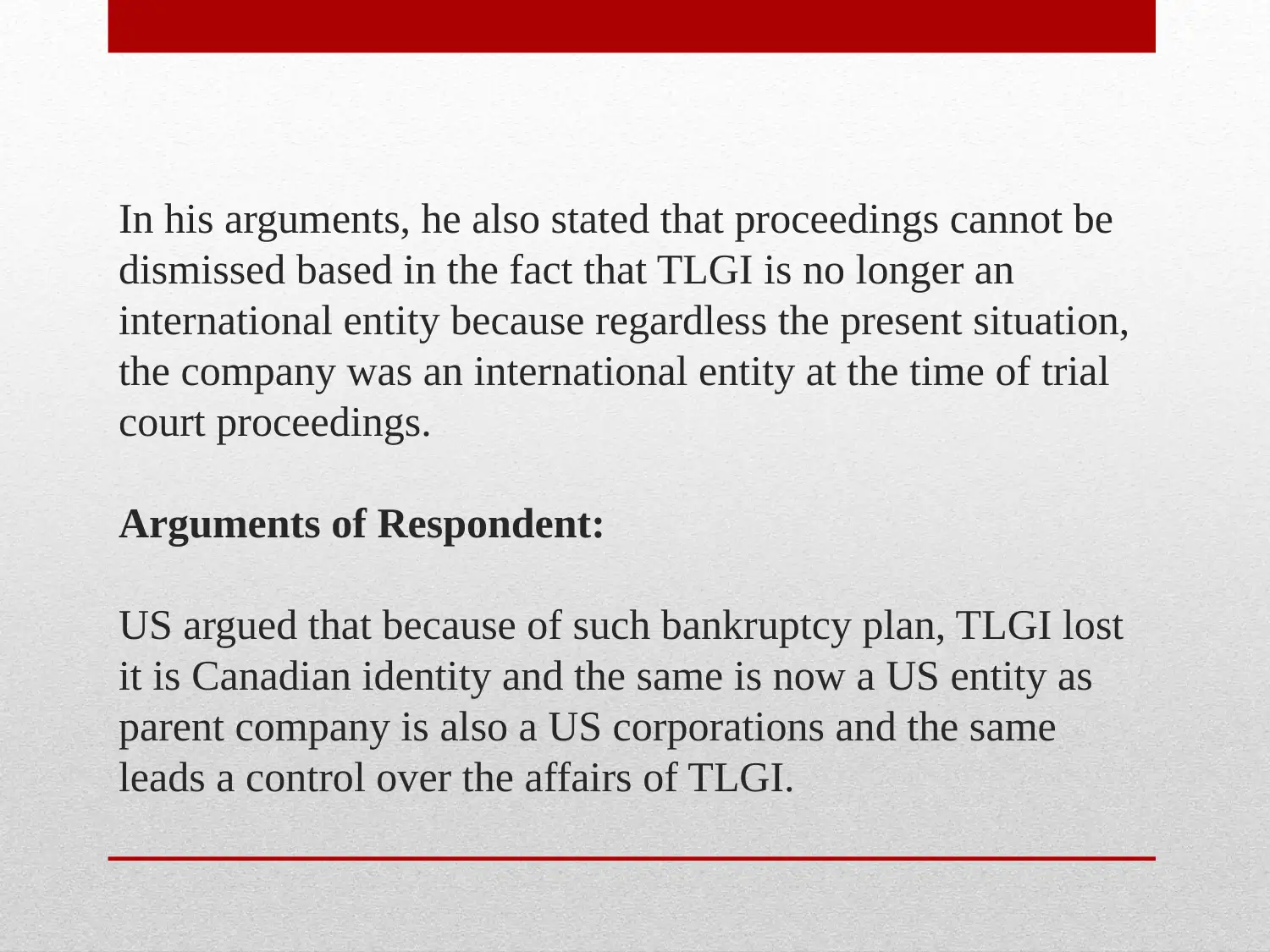
In his arguments, he also stated that proceedings cannot be
dismissed based in the fact that TLGI is no longer an
international entity because regardless the present situation,
the company was an international entity at the time of trial
court proceedings.
Arguments of Respondent:
US argued that because of such bankruptcy plan, TLGI lost
it is Canadian identity and the same is now a US entity as
parent company is also a US corporations and the same
leads a control over the affairs of TLGI.
dismissed based in the fact that TLGI is no longer an
international entity because regardless the present situation,
the company was an international entity at the time of trial
court proceedings.
Arguments of Respondent:
US argued that because of such bankruptcy plan, TLGI lost
it is Canadian identity and the same is now a US entity as
parent company is also a US corporations and the same
leads a control over the affairs of TLGI.
⊘ This is a preview!⊘
Do you want full access?
Subscribe today to unlock all pages.

Trusted by 1+ million students worldwide
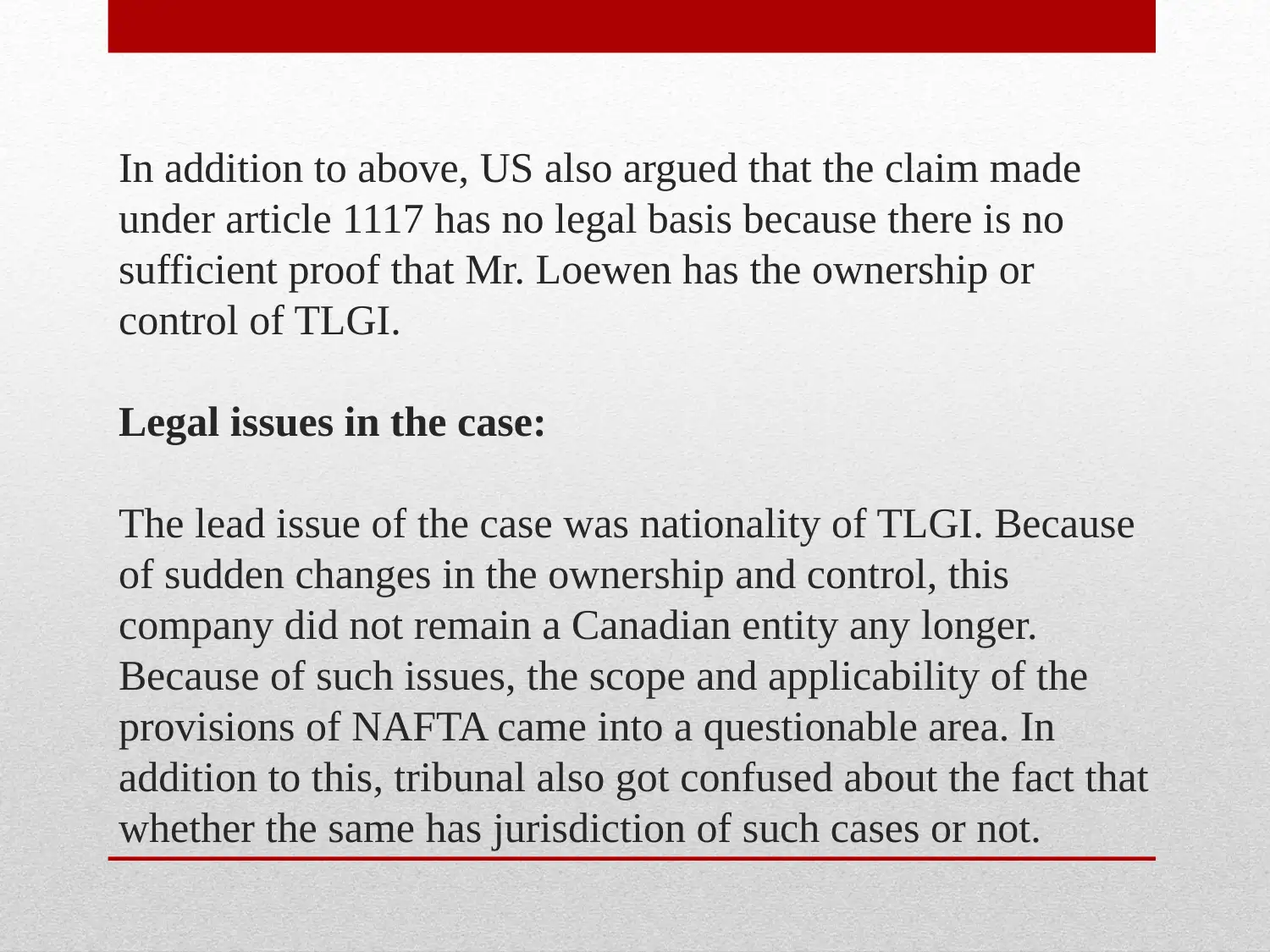
In addition to above, US also argued that the claim made
under article 1117 has no legal basis because there is no
sufficient proof that Mr. Loewen has the ownership or
control of TLGI.
Legal issues in the case:
The lead issue of the case was nationality of TLGI. Because
of sudden changes in the ownership and control, this
company did not remain a Canadian entity any longer.
Because of such issues, the scope and applicability of the
provisions of NAFTA came into a questionable area. In
addition to this, tribunal also got confused about the fact that
whether the same has jurisdiction of such cases or not.
under article 1117 has no legal basis because there is no
sufficient proof that Mr. Loewen has the ownership or
control of TLGI.
Legal issues in the case:
The lead issue of the case was nationality of TLGI. Because
of sudden changes in the ownership and control, this
company did not remain a Canadian entity any longer.
Because of such issues, the scope and applicability of the
provisions of NAFTA came into a questionable area. In
addition to this, tribunal also got confused about the fact that
whether the same has jurisdiction of such cases or not.
Paraphrase This Document
Need a fresh take? Get an instant paraphrase of this document with our AI Paraphraser
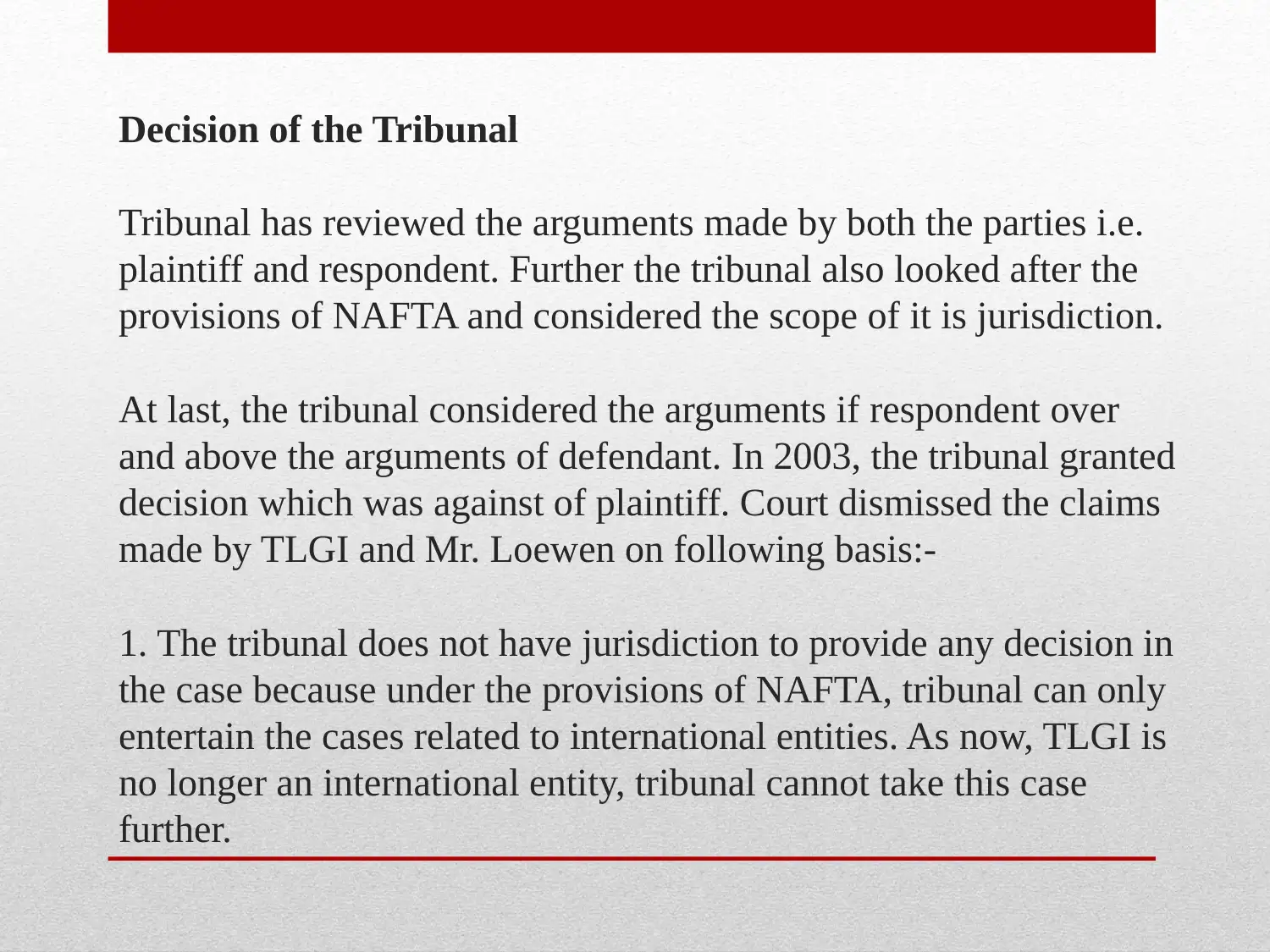
Decision of the Tribunal
Tribunal has reviewed the arguments made by both the parties i.e.
plaintiff and respondent. Further the tribunal also looked after the
provisions of NAFTA and considered the scope of it is jurisdiction.
At last, the tribunal considered the arguments if respondent over
and above the arguments of defendant. In 2003, the tribunal granted
decision which was against of plaintiff. Court dismissed the claims
made by TLGI and Mr. Loewen on following basis:-
1. The tribunal does not have jurisdiction to provide any decision in
the case because under the provisions of NAFTA, tribunal can only
entertain the cases related to international entities. As now, TLGI is
no longer an international entity, tribunal cannot take this case
further.
Tribunal has reviewed the arguments made by both the parties i.e.
plaintiff and respondent. Further the tribunal also looked after the
provisions of NAFTA and considered the scope of it is jurisdiction.
At last, the tribunal considered the arguments if respondent over
and above the arguments of defendant. In 2003, the tribunal granted
decision which was against of plaintiff. Court dismissed the claims
made by TLGI and Mr. Loewen on following basis:-
1. The tribunal does not have jurisdiction to provide any decision in
the case because under the provisions of NAFTA, tribunal can only
entertain the cases related to international entities. As now, TLGI is
no longer an international entity, tribunal cannot take this case
further.
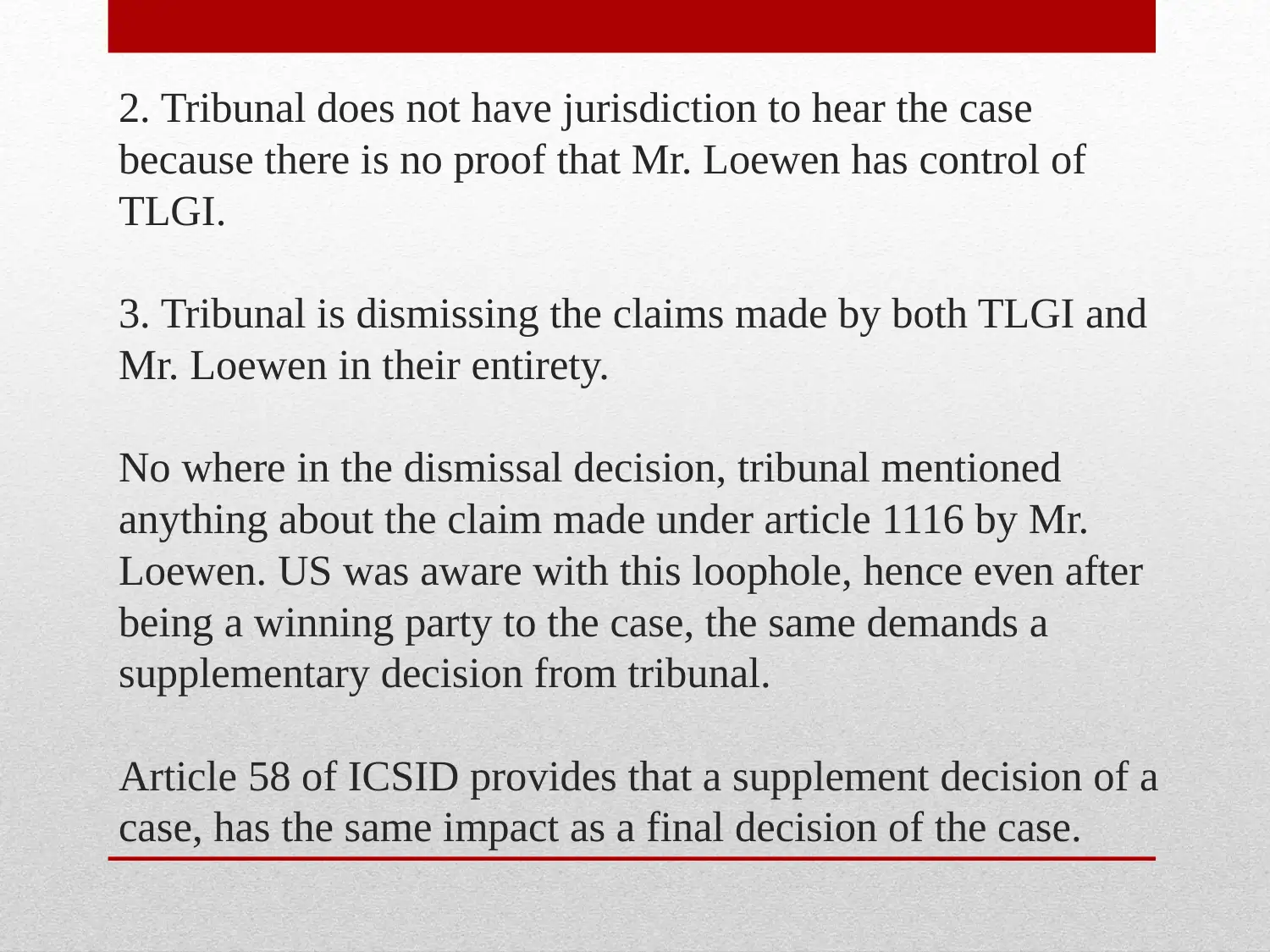
2. Tribunal does not have jurisdiction to hear the case
because there is no proof that Mr. Loewen has control of
TLGI.
3. Tribunal is dismissing the claims made by both TLGI and
Mr. Loewen in their entirety.
No where in the dismissal decision, tribunal mentioned
anything about the claim made under article 1116 by Mr.
Loewen. US was aware with this loophole, hence even after
being a winning party to the case, the same demands a
supplementary decision from tribunal.
Article 58 of ICSID provides that a supplement decision of a
case, has the same impact as a final decision of the case.
because there is no proof that Mr. Loewen has control of
TLGI.
3. Tribunal is dismissing the claims made by both TLGI and
Mr. Loewen in their entirety.
No where in the dismissal decision, tribunal mentioned
anything about the claim made under article 1116 by Mr.
Loewen. US was aware with this loophole, hence even after
being a winning party to the case, the same demands a
supplementary decision from tribunal.
Article 58 of ICSID provides that a supplement decision of a
case, has the same impact as a final decision of the case.
⊘ This is a preview!⊘
Do you want full access?
Subscribe today to unlock all pages.

Trusted by 1+ million students worldwide
1 out of 19
Your All-in-One AI-Powered Toolkit for Academic Success.
+13062052269
info@desklib.com
Available 24*7 on WhatsApp / Email
![[object Object]](/_next/static/media/star-bottom.7253800d.svg)
Unlock your academic potential
Copyright © 2020–2025 A2Z Services. All Rights Reserved. Developed and managed by ZUCOL.

